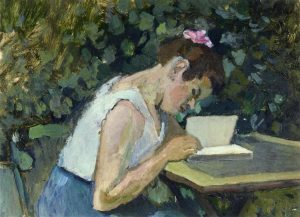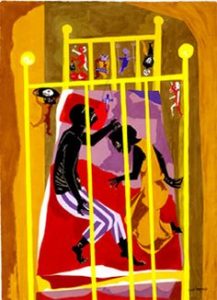 I read to learn new things, to understand the world, to challenge myself. I’ve always been the kind of person that, when I read a good book that references another book, I want to go read that other book. I want to know… well, everything, really.
I read to learn new things, to understand the world, to challenge myself. I’ve always been the kind of person that, when I read a good book that references another book, I want to go read that other book. I want to know… well, everything, really.
I was up late reading Joplin’s Ghost by Tananarive Due. The main character, Phoenix, is a musician who becomes haunted by the ghost of Scott Joplin. I know who Scott Joplin is, and everyone’s heard The Entertainer, but there were a lot of other pieces mentioned, as well as other musicians. So I pulled up YouTube and listened to some guy play a dozen Joplin pieces on the piano while I continued to read. The next day, I looked up Jacob Lawrence’s Dream I, so I could see the painting Due described and better imagine the room Phoenix was in.

When I was getting my BA in English 15 years ago, I had one professor who was very excited about the future of texts, where authors would embed links to other content in other media to enhance the experience and to make it something more than just reading. At the time, it seemed mildly interesting. But being the driver of my own hypertext experience has definitely enriched my reading life.
Now, I get irritated when I google for something and the internet does not offer it right up to me, as if its entire reason for existing is to help me read my book. I remember going camping with my friend and reading Virginia Woolf and being frustrated that I couldn’t look up the words I didn’t know, since we had no cellular coverage.
Multi-language users use code-switching to speak directly to their communities. Lit that likes to consider itself high-brow makes a habit of adding different languages and obscure references to signal its class. These texts can now be appreciated by those of us it maybe wasn’t intended for.
How different are these books without all of this outside information so readily available? Would I have liked Joplin’s Ghost as much if I hadn’t heard those songs? I loved the book, it’s fantastic. But that richer experience is something I love, too.